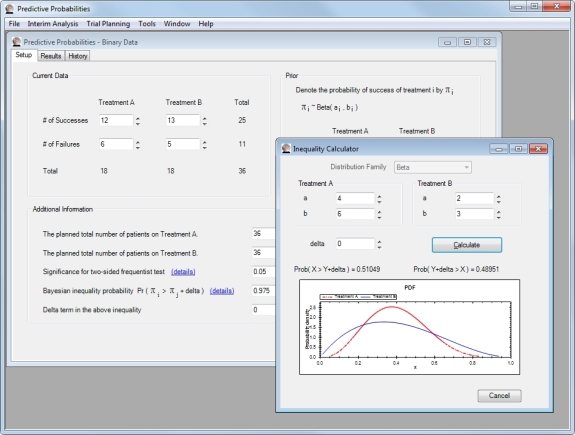Predictive Probabilities
This software provides predictive probability analysis of two-arm clinical trials.
The software computes the posterior predictive probabilities concluding that one
arm or the other is superior or stopping a trial due to futility. This software
is often used in designing clinical trials and in conducting interim analyses.
The software supports clinical trials in which the primary endpoint is binary or
time-to-event (TTE).
Note that although the user interface focuses on two-arm trials, one can use the
software to analyze single-arm trials by specifying the number of observations on
one of the arms to be zero.
See the
Predictive Probabilities User's Guide for more information.
What's New in Version 1.5
- Minor bug fixes and other improvements
- Occasionally sends usage statistics and crash reports to our biostatistics software
support team to improve your experience using the software
Requirements
- Windows 7
(other Windows versions may be compatible but this has not been tested)
- Administrative permissions may be required to install Predictive Probabilities depending
on the chosen installation location.
- The following packages will be installed if they are not present:
- Microsoft .Net 4.0 Framework
- Microsoft Visual C++ 2010 x86 Redistributable 10.0.40219
- Microsoft Windows Installer 3.1
- To view the
Predictive Probabilities User's Guide a PDF file viewer (not included with the
software) such as Adobe Reader (available for free
here) must be installed.
- To follow the "Send feed back via email" link in the Help -> About
window, an email client such as Microsoft Outlook (not included with the software)
must be installed.

See
Predictive Probability Interim Analysis for a brief explanation of the statistics
behind this software. See also the online documentation.
See also on this site
Phase II Predictive, software using Bayesian predictive probability in the
design of phase II clinical trials.
J. Kyle Wathen developed the first version of the software, using
C# for the user interface and C++ for the numerical calculations. Hoang
Nguyen and Clift Norris developed version 1.3. John Cook and Clift Norris developed
version 1.4. John Venier developed version 1.5.
 Biostatistics Software --- Desktop / Cloud
Biostatistics Software --- Desktop / Cloud
